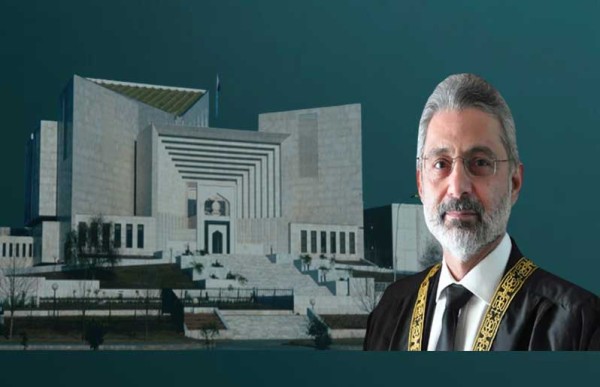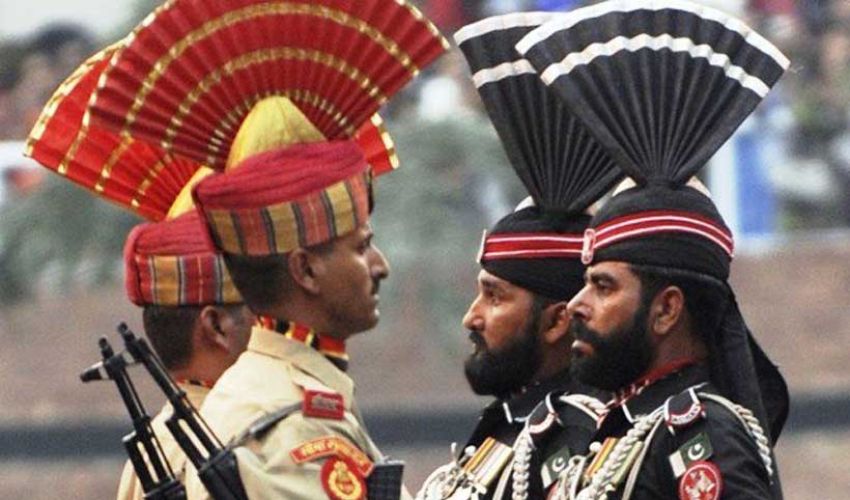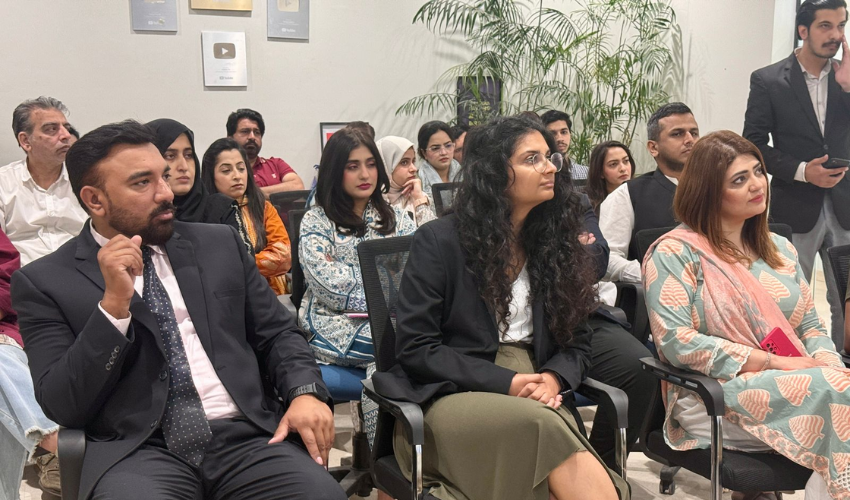The Supreme Court of Pakistan (SCP) wrapped up all pleas related to polls in 90 days and declared February 8 as the date of the general elections.
The apex court issued an order on the case after the AGP and PTI lawyer presented President Arif Alvi’s consent letter that cemented both ECP and the Presidency had consensus on the February 78 date for holding general elections.
Moreover, ECP also submitted the notification of holding of general elections on February 8.
“… the Election Commission of Pakistan in exercise of its powers under Article 57(1) of the Elections Act and all other powers enabling it in that behalf, hereby announces February 8, 2024 as poll date for the general elections,” the notification reads.
Chief Justice Qazi Faiz Isa ordered that it is imperative for federal and provincial governments to adhere to the electoral process without engaging in any legal maneuvers and asked the government to reinforce the commitment to uphold the democratic process.
During the proceedings, Ali Zafar urged the court to add a statement ‘declaring elections as mandatory’, pinpointing February 8 as the crucial date. In response, the CJP replied: "We have written this, the elections will be held on time."
CJ Faiz Isa remarked that there is now unanimous agreement on holding general elections on February 8.
Justice Qazi pointing towards Election Commission of Pakistan (ECP) officials and their legal representatives, sought assurances regarding their ability to meet the scheduled elections. He urged ECP officials to voice their concerns promptly in case of any obstacles.
The court concluded the proceedings by disposing of all the petitions related to ‘elections in 90 days’.
SC directs AGP to produce President’s consent letter on 'Feb 8 polls date'
The Election Commission of Pakistan (ECP) has submitted the record of the conversation between President Arif Alvi and ECP chief election commissioner Sultan Sikandar Raja, before the Supreme Court during the hearing of the case related to the holding of general elections in 90 days.
The hearing has been adjourned for some time.
At the beginning of today's hearing, Attorney General Mansoor Awan appeared in the Supreme Court and said that the minutes of the meeting between the President and ECP would be provided to the court, to which CJP Qazi Faez Isa inquired how much time he needed to produce the document. The AGP replied he needed half an hour.
The CJP remarked that SC will hear this case after today’s cases.
After a short break in the hearing, the Election Commission officials reached the Supreme Court with the meeting minutes and presented the record of the communication with the President.
According to documents submitted, the Election Commission of Pakistan (ECP) proposed a February 11 (Sunday) date for general elections to President Dr Arif Alvi.
After receiving the meeting minutes, the Chief Justice of Pakistan inquired about the President’s signature on the document—as it will show that there was a consensus on the February 8 date for the general elections.
The Attorney General said that the President had given his consent letter separately.
The CJP Justice inquired where the letter of consent was, to which AGP replied that the document would also be presented before the court.
CJP Qazi inquired about the distance between the President's House and the Supreme Court and remarked SC would not leave any gray area (in this case of holding general elections in 90 days).
During the hearing, election commission officials, including Attorney General for Pakistan Mansoor Usman Awan, Pakistan Tehreek-e-Insaf (PTI) lawyer Ali Zafar and Pakistan People's Party (PPP) lawyer Farooq H. Naik appeared in the Supreme Court.
PTI lawyer Ali Zafar, while giving arguments at the beginning of the hearing, said he would limit his request to only one point, which was that the elections should be held on time according to the Constitution.
Ali Zafar said that according to articles 58 and 224, if elections are not held, there will be no parliament, and laws will not be made. Giving the date of elections and giving a schedule are two different things.
The CJP remarked that his plea for elections within 90 days has become ineffective. During the hearing, the Pakistan People's Party was also allowed to become a party in the case.
Ali Zafar argued that if the president dissolves the assembly, he will have to give the election date within 90 days. At this, the chief justice inquired whether it was necessary for the president to consult the prime minister to give a date. The lawyer said it was not necessary, as the president has his own constitutional duty to give a date.
Justice Athar Minallah inquired whether the president has given a date for elections. Ali Zafar said in his opinion, that the president has given the date, but the Election Commission of Pakistan has said it was not the president's authority.
'President has to give the date'
Justice Minallah remarked that the president has to order the date and the government has to notify it.
The lawyer said the Law Ministry gave an opinion that the president cannot give a date for elections, while if 90 days are counted, the elections should have been held on November 7.
Justice Athar Minallah asked why it took so long for the president to write a letter to the election commission, while the CJP inquired whether the president approached the apex court to seek an opinion. The lawyer responded in the negative.
The CJP asked then how the president could advise someone else to do it.
Justice Minallah remarked that the command of the Constitution was very clear, the president had to give a date for elections, and there was no disagreement over this.
The CJP asked the lawyer whether he wanted the court to issue an instruction to the president to give the date. He remarked that the president says he has sought an opinion from so-and-so, asking if the court can issue a writ against the president. “According to you, the president has the authority to announce the election date. Does the SC also have the authority? If the president does not agree, we will issue him a contempt of court notice,” the CJP added.
The CJP remarked that holding elections is a good thing, not a problem. He inquired why the president was not called and asked to give the date for elections, while Justice Aminuddin remarked that the argument was that the president deviated from the Constitution.
Justice Minallah remarked that, in retrospect, the government, the election commission, and the president are all responsible. Now, the question is what the results will be, as the elections should be held on time.
The CJP asked if the PTI lawyer wanted the court to take action against the president. The president has given up and asked them to consult the court.
Violation of Constitution by delaying polls
Justice Minallah remarked that everyone, including the election commission, is responsible for the delay in elections. After the expiry of the stipulated period of 90 days, every day the Constitution was being violated, and whoever is not conducting the elections according to the Constitution is suspending the Constitution, which can call for invoking Article 6.
The CJP remarked that the election commission is saying that it was their authority to give a date after an amendment to Section 57. He further said that if Section 57 has to be read with Article 58, then the commission is right, there was no need to consult the president, and he should give a date for elections. After that, let’s see what the election commission says.
Ali Zafar said that, in his opinion, the president should give a date only after consulting the election commission. At this point, the chief justice said if the ECP did not consult the president, then the date should be given.
Justice Minallah said he agreed to the extent that the president should give the date after consulting the ECP. Now, the commission has to answer why it refused to consult the president. If this is not done, it is akin to suspending the Constitution and invoking Article 6.
Ali Zafar said if someone did not act according to the Constitution, the Supreme Court could order action. Justice Minallah asked what order he wanted the court to issue to the president. He also told Supreme Court Bar Association President Abid Zuberi that the court did not say that elections in 90 days were not necessary under the Constitution.
Justice Minallah further remarked that they could not be responsible for a further delay, and under Article 48, now the president of Pakistan has to give a date for elections.
ECP informs SC: Elections on February 11
During the hearing, the lawyer for the election commission stated that the process of delimitation of constituencies will be completed by November 30 and elections will be held on February 11.
The lawyer said all arrangements, including the delimitation, will be completed on January 29, while the final lists will be completed on December 5. If 54 days were counted from December 5, then it came down to January 29, adding that they were looking for a Sunday for the convenience of the people in the elections.
Justice Minallah remarked that the election commission has rewritten the Constitution by not consulting the president. The CJP inquired whether the president was on board, to which the ECP lawyer said they were not bound to take the president on board.
'Everyone is responsible for the delay'
The court expressed anger for not consulting the president before giving the date. It ordered the election commission officials to consult the president on the date.
The CJP remarked that if the president and the ECP met today, the court will issue an order today, adding that the court will bind the ECP to act on whatever date is finalized.
PPP's lawyer Farooq H Naik argued the president violated the Constitution by not holding the elections in 90 days. The CJP remarked that it has not been 90 days as of now so there is no violation.
Justice Minallah said everyone is responsible for the delay in elections.
The attorney general requested the court not to give a decision on whose authority it was to give a date for the elections and said that the court should not decide on clause 5 of Article 48 of the Constitution.
General elections 2024: Date changes yet again
The Election Commission of Pakistan (ECP) and President Dr Arif Alvi reached a consensus on Thursday to hold general elections in the country on February 8.
According to the statement issued by the electoral watchdog, the consensus was reached in a meeting of the Chief Election Commissioner (CEC) and President Dr Arif Alvi.
The President's House has also issued a statement on the agreed-upon date of the elections. The delegation of the ECP visited the President's House for the meeting on the orders of the Supreme Court, the statement said.
Political parties react to general elections date
Political parties including Pakistan Tehreek-e-Insaf (PTI), Pakistan Peoples' Party (PPP), Pakistan Muslim League-Nawaz (PML-N), Muttahida Qaumi Movement (MQM), Jamiat Ulema-e-Islam (JUI), Awami National Party (ANP) on have reacted to the announcement of the date for general elections.
Supreme Court of Pakistan (SC) ordered the Election Commission of Pakistan (ECP) to announce the date of the general elections today, while the counsel of the electoral watchdog told the apex that general elections in the country will be held on February 11, 2024.
The top court has directed the ECP to consult with the President and other relevant stakeholders to finalize the election date and report back to the court tomorrow (Friday).
This decision has evoked various responses from political parties, each sharing their opinions on the announced date for the general elections.
PPP wants all political parties to participate in elections
Pakistan People’s Party (PPP) senior leader Qamar Zaman Karia talking to SAMAA TV said the uncertain situation has finally culminated in the elections date being announced.
“The date announcement was necessary so that political parties could start the political process. In fact, the PPP has launched an electoral campaign. Let’s end the uncertainty,” he said.
PML-N reacts to Feb 11 election date
The Pakistan Muslim League-Nawaz has termed the announcement of the general elections 2024 date a good development.
PML-N senior leader Muhammad Zubair, talking to SAMAA TV, said holding general elections on February 11 is a good step.
“There was uncertainty related to the elections in the country. The Constitution is very clear regarding the elections,” he added.
ECP urged to ensure transparent elections
Jamaat-e-Islami (JI) Emir Sirajul Haq on Wednesday urged the Election Commission of Pakistan (ECP) to ensure transparent polls in the country.
He expressed optimism that the people of the country will cast their votes for the JI on the basis of the party’s reputation. Haq bemoaned the country’s economic situation, saying, “The people are facing severe economic hardships. The world is witnessing a decrease in inflation, but in our country, prices are skyrocketing.’’



























